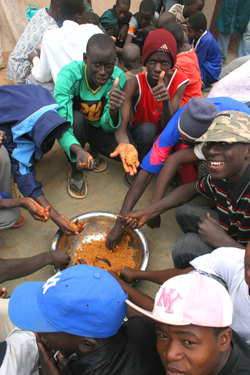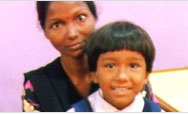You are here » Home » Telling Our Story
Success Story
Students receive meals and supplies that help them focus on classes
Providing Sustenance to Enable Studies

Photo: Richard Nyberg/USAID/Senegal
Students enjoy a hot meal at a community-based school in Mboumba, Senegal.
“By helping the students at these schools, you are also helping the women, the men and every household within the village,” said Thierno Bass, head of Mboumba’s community-based schools.
Community-based school students in northern Senegal would beg for alms every day to help pay for their school meals. But many of these same children now spend more time in class thanks to a successful hot meal program funded by USAID which enables traditional community-based schools to focus on feeding the minds of their students.
In the village of Mboumba, like in many Senegalese villages, traditional Muslim schools receive little assistance and the students live in difficult conditions. Boarding at the school because their families are too poor to provide food and education, students under the USAID-financed program receive hot meals, medical supplies, bedding, mosquito nets to prevent malaria, and vocational and literacy training.
“By helping the students at these schools, you are also helping the women, the men and every household within the village,” said Thierno Bass, head of Mboumba’s community-based schools. Another school head, Thierno Diop, said: “We have already seen immediate results from this program as students are able to stay in school longer and learn more each day.”
The US Government provides the funding and food commodities for the community-based school feeding program, with food commodities made available through USAID’s Food for Peace program. The program now reaches 3,800 students in nine schools in the Podor and Coki areas of northern Senegal. This activity aims to improve the students’ living and learning conditions, health, and nutrition, as well as to strengthen community ties to the schools to help ensure a brighter future for these young people.
Print-friendly version of this page (533kb - PDF)
Click here for high-res photo
Back to Top ^ | 

